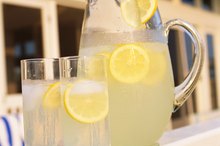Monster Energy Drink Nutrition Information
Energy drinks are beverages that supply caffeine and a combination of various ingredients designed to increase energy levels. One of the manufacturers of energy drinks is Monster Energy. Monster produces six different types of products, with over 13 flavors of energy drinks alone. DailyFinance.com reports that Monster Energy is a top seller of energy drinks in the United States.
Ingredients in Monster Drinks
All of the Monster energy drinks contain base ingredients such as carbonated water, sweeteners, flavorings, preservatives and vitamins. Common sweeteners include sucrose, glucose and sucralose, according to the Monster Energy website. Flavorings and preservatives can include a variety of natural flavors, ascorbic acid, sodium chloride and colors. Monster will add other ingredients to create the specific recipe for different energy drinks.
Types of Monster Drinks
XS Energy Drink Ingredients
Learn More
Monster produces a variety of energy drinks. The most common type of Monster energy drink is the regular Monster drink. The Monster LoCarb drink uses less sugar while the Monster Assault more than doubles the energy capabilities with twice as much sugar, according to DietFacts.com. Energy drinks that include specific ingredients are the Monster Khaos which includes fruit juice, Monster Java made with coffee and milk and Monster M-80 with tropical juices.
Calories in Monster
One 8-ounce serving of a Monster energy drink will typically supply about 100 calories. Monster Assault and XXL, for example, both provide 100 calories per serving while the M-80 energy drink supplies 90 calories per serving, as per DietFacts.com. Monster LoCarb, however, provides only 10 calories per serving with the reduced amount of carbohydrates.
Carbohydrates in Monster
Review of Lifewater by SoBe
Learn More
Carbohydrates and sugars provide 100 percent of the calories in Monster energy drinks, which are commonly recognized as being high in sugar. One 8-ounce serving of full-strength Monster energy has 25 to 30 calories. Monster Assault and XXL have 27 grams of carbohydrates and 27 grams of sugars per serving. Monster LoCarb uses artificial sweeteners to reduce the amount of sugars to 3 grams per 8-ounce serving, according to nutrition data from iChange.com.
Energy Ingredients
The energy producing capabilities of Monster energy drinks come from a vitamin and caffeine blend. Vitamins in the energy drinks include 20 milligrams of niacin, 1.7 milligrams of riboflavin, 2 milligrams of vitamin B-6, 6 micrograms of vitamin B-12 and 60 milligrams of vitamin C. Panax-ginseng is also added for energy and will typically include about 200 milligrams. Most of the Monster energy drinks will contain 80 milligrams of caffeine per serving. If you are sensitive to caffeine you may experience shakes, nervousness, anxiety and a rapid heartbeat after consuming a Monster energy drink. The U.S. Food and Drug Administration reports that most people can consume up to 200 milligrams of caffeine per day without any side effects.
Related Articles
References
Writer Bio
Based in Nebraska, Jeremy Hoefs began writing fitness, nutrition, outdoor and hunting articles in 2006. His articles have been published in "Star City Sports," "Hunting Fitness Magazine" and RutWear field journals, as well as on the Western Whitetail website. Hoefs graduated with a Bachelor of Science in exercise science from Nebraska Wesleyan University.









